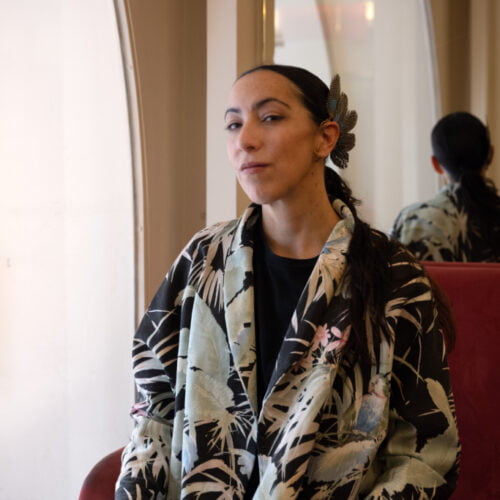An incantation, an exorcism and a celebration all at once. Exótica is both a tribute and a lesson: meet a lost part of European dance history.
TicketsVenue
Duration
110 minutes
6 Sep
19:00
7 Sep
16:00
In early 20th century Europe, artists La Sarabia, Nyota Inyoka, François (Féral) Benga and Leila Bederkhan presented their dances in Europe with great success. However, as these dances were not recognised as part of the Western dance canon, they fell into oblivion.
In Exótica - On the brown history of European dance - Amanda Piña breathes new life into these works. Here she searches the legacy of racialised dancers who have performed on European theatre stages, in what she calls "the brown history of European dance".
Exótica is an exuberant ritual where the dances come to life as in a seance where our ancestors, queers and women of colour is part of the present and the past. With dance and speech in a grand scenography, a dialogue is staged with the audience's own gaze and history in focus. With the Exótica Amanda Piña initiates a spell, an exorcism and a celebration all at once.
La Sarabia, (1878-1988), Nyota Inyoka, (1896-1971), François "Féral" Benga (1906-1957) Leila Bederkhan (1903-1986) travelled through Europe presenting their dances, moving between exotification and the white gaze. What kind of work did these racialised dancers and choreographers do at the time, how was it perceived by contemporaries - and how can we understand it today? Exótica is an evening of togetherness and longing for dance.
"With this research, I would like to get to know my direct ancestors: fellow female and queer artists, dancers, and choreographers of colour who lived and worked in Europe at the beginning of the 20th century. This work aims to revive them. It is a spiritual search for what consequences the white norm has, conceiving it as an internalised, self-invisible ideology, an unmarked and unnamed position."
Amanda Piña

About Amanda Piña
Amanda Piña is a Mexican-Chilean-Austrian choreographer, dancer and cultural worker who alternately live in Vienna and Mexicow City. Her choreographic work is about thecolonisation of art focusing on the political and social power of dance. Her performances are contemporary rituals performed in order to temporarily dismantle ideological differences between modern and traditional, between humans and animals and between nature and culture. Amanda Piña is interested in making art beyond the idea of a product - and to develop new frameworkswork to create sinward-looking experiences.
Photo: Bea Borgers
Dancer and choreographer Marit Shirin Carolasdotter talks to Amanda Piña.
Artistic direction
Amanda Piña
Choreographic research
Ángela Muñoz Martínez, André Bared Kabangu Bakambay, Venuri Perera, iSaAc Espinoza Hidrobo, Amanda Piña
Dramaturgy
Nicole Haitzinger
Integrated design
Michel Jimenez
Stage design
Forêt Asiatique (1921) by Albert Dubosq, recreated by decor studio Jozef Wouters as part of Amanda Piña's contribution to Infini #18 (2022)
Technical management
Marcelo Daza, Emilio Cordero | Music: Ángela Muñoz Martínez, Zevra Sound design: Dominik Traun
Costume
Mr Federico Protto
assistant director
Mr Pierre-Louis Kerbart
Production
Amanda Piña/Fortuna
Co-production
Kunstenfestivaldesarts, Holland Festival, Festival d'Automne à Paris, Tanzquartier Wien, PACT Zollverein, DDD-Festival Dias da Dança, La Bâtie-Festival de Genève, NEXT Festival
Distribution
Something Great
With the support of
De Singel, KWP Kunstenwerkplaats, wpZimmer
Thanks to
Stadsschouwburg Kortrijk, Showtex, Bruno Forment, FWF funded project Border Dancing Across Time P-31958, Christina Gillinger-Correa Vivar (archival research), Rolando Vázquez (decolonial theory/interview) Funded by the Cultural Department of the City of Vienna, Arts and Culture Division of the Federal Chancellery of Austria Performances in Brussels with the support of Österreichisches Kulturforum in Brussels
